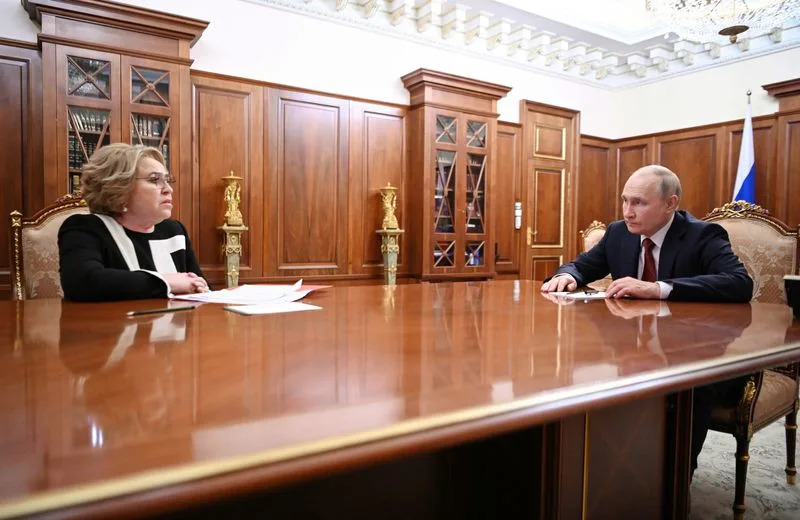An ally of President Vladimir Putin warned Europe on Tuesday that Russia has already drafted legislation to retaliate if nearly $300 billion of Russian assets were seized by the West and used to help Ukraine.
After President Vladimir Putin sent troops into Ukraine in 2022, the United States and its allies prohibited transactions with Russia's central bank and finance ministry, blocking around $300 billion of sovereign Russian assets in the West.
Russian President Vladimir Putin meets with Russian Federation Council Speaker Valentina Matviyenko at the Kremlin in Moscow.
Top officials in the United States want to seize the assets to help support Ukraine, though some bankers and European officials are worried that simply taking the assets would create a dangerous precedent.
The U.S. House of Representatives passed legislation on Saturday including a bill with a provision that would allow the confiscation of Russian sovereign assets, though the lion's share of the assets are in Europe.
"We also have a prepared answer," Valentina Matviyenko, the speaker of the Russian upper house of parliament, was quoted as saying by state news agency RIA. "We have a draft law, which we are ready to consider immediately, on retaliatory measures."
"And the Europeans will lose more than we do," Matviyenko, who is a member of Russia's powerful Security Council, said.
Matviyenko did not give specifics on what the response would be to the seizing of Russian assets which is still under discussion in the West.
One option being discussed by the West is to confiscate the income on the underlying assets without taking the actual asset itself.
Putin says the West unleashed what he casts as an economic war against Russia but has touted both the resilience of the Russian economy, which grew 3.6% last year, and the failure of sanctions of stop Russian trade.
The Kremlin has repeatedly said that any seizure of its assets would go against all the principles of free markets which the West proclaims and that it would undermine confidence in the U.S. dollar and euro while deterring global investment and undermining confidence in Western central banks.
Russia has said it will challenge any confiscation of its assets in the courts.
Some Russian officials have suggested that if Russian assets are confiscated then foreign investors' assets stuck in special so-called type "C" accounts in Russia could face the same fate.
It is not clear exactly how much money is in these accounts.
The speaker of the lower house of the Russian parliament, Vyacheslav Volodin, said on Monday that Russia had grounds to seize Western assets after the move by the U.S. House of Representatives.
Volodin said that of the $280 billion of Russian assets frozen abroad, only $5 to $6 billion was in the United States while about 210 billion euros ($224 billion) was in the European Union.
Russia's economic strength will last another 18 months before unraveling as Putin grapples with policy 'trilemma,' think tank says
-
Russia's economy could begin to see major challenges in the next year-and-a-half, think tank researchers write.
-
Putin is facing a policy "trilemma" as the nation wades through the third year of war in Ukraine.
-
"Russia's economy is now stable both in spite of and as a result of Western sanctions."
Russia's economic strength could last another year-and-a-half before it starts to fade, according to the Carnegie Endowment for International Peace.
The Washington DC-based think tank pointed to the nation's show of defiance amid its invasion of Ukraine, with the Russian economy still strong despite rising military costs and Western trade restrictions. The International Monetary Fund has predicted that the country will grow faster than all other developed economies, including the US, this year.
That's partly because Russia has been able to find ways around sanctions, researchers from the Carnegie Endowment said, like selling its oil to its allies while importing Western goods through third-party countries.
"A paradoxical situation has emerged: Russia's economy is now stable both in spite of and as a result of Western sanctions," Alexandra Prokopenko, a fellow at the Carnegie Russia Eurasia Center, wrote in a report. "But this hard-won stability is not eternal. In a best-case scenario, the current arrangement will likely begin to come apart within eighteen months owing to growing imbalances and possible social problems," Prokopenko warned.
Russia is dealing with a policy "trilemma," with three big issues facing the nation as it goes through its third year of war in Ukraine. For Putin, the problem boils down to funding Russia's military, maintaining living standards for Russian citizens, and keeping the economy stable — three goals that are becoming harder for Russia to achieve, according to Prokopenko.
Signs of weakness have already started to bubble to the surface. The Kremlin plans to spend a record amount on its military this year. That could be drag on the nation's economy, as defense spending is "generally unproductive," and it isn't clear if the Russia-Ukraine war is coming to an end anytime soon, Prokopenko said.
Living conditions could also start to deteriorate. While economists say Russians are living mostly normal lives for now, inflation has soared, prompting the central bank to raise interest rates to a whopping 16%. If the central bank succeeds in lowering inflation, that will eat into workers' incomes as the economy starts to contract.
Falling incomes could also impact the ability of Russians to pay off their loans, raising the risk of debt distress, the think-tank said.
"This increases the risk of social discontent: no one will be happy to take a pay cut," Prokopenko added.
And while Russia has the tools to keep its economy stable and avoid a recession for now, economists have warned of a grim future ahead, given the nation's shortage of workers, declining productivity, and increasing isolation from the rest of the world.
"In an economy subordinate to political imperatives, there are few incentives for sustainable development. Sooner or later, this will hurt the well-being of ordinary Russians. In other words, temporary fixes and a decline in living standards will add to the political and economic headwinds facing the Kremlin," Prokopenko said.
Experts have warned of near-term social unrest in Russia, particularly as living standards continue to deteriorate. The nation could see massive unrest by the end of the year, three economists told Business Insider, especially if the West continues to tighten sanctions on Moscow.



